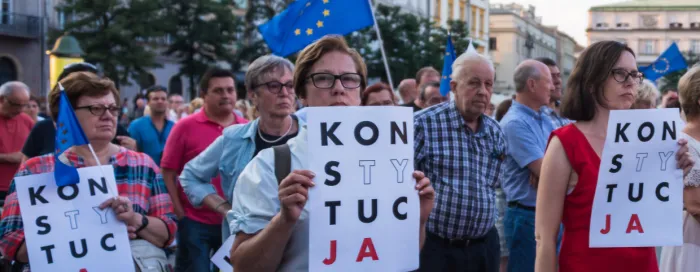Let’s dare more democracy – and this depends on strengthening the rule of law. This is one of the main political priorities of the PES Group for the new mandate of the European Committee of the Regions. In light of the rule of law backsliding in some Member States in recent years, the issue has also come to the forefront in the Committee. The PES Group has always been very vocal about reinforcing the rule of law’s principle within the Member States, and has stressed the importance of ensuring the key role of local and regional authorities in the endeavour to defend our European values.
The Opinion on “Strengthening the rule of law within the Union – A blueprint for action” drafted by Franco Iacop, Member of the Regional Council of the Friuli Venezia Giulia Region (Italy) and former member of the PES Group, highlights the role of local and regional actors in the resistance against the backsliding. PES Group President Christophe Rouillon presented the opinion for adoption during the inaugural plenary session of the Committee’s seventh term of office. Progressive local and regional authorities are leading the fight against illiberalism. At the same time, Europe’s cities and regions must not be held hostage by mechanisms of conditionality. The later can limit their access to funding if their respective national governments undermine European values. The European Committee of the Regions thus supports the PES rapporteur’s endorsement of the proposal to create a horizontal EU level mechanism to monitor the state of the rule of law in all EU member states on an annual basis.
“The rule of law is not only one of the fundamental common values of the European Union. It is also an existential condition for its functioning. Civil society and local and regional authorities are crucial in strengthening the rule of law. We believe that sanctions are necessary for those violating the rule of law but for perpetrators, not for victims. This Committee has long pressed the case for the regions and cities of Europe not to be sanctioned for breaches of the rule of law by national governments. With this opinion, we have set out ways in which a deeper cooperation with local communities (their civil society, their legal defenders and their public administrations) can contribute to the defence and promotion of a culture of law,” said Rouillon.
"L'état de droit n'est pas seulement un atout de l'Union Européen, mais c'est une condition existentielle de son fonctionnement.
— PES Group Committee of the Regions (@PES_CoR) February 12, 2020
Les principes de l’état de droit sont des valeurs communes qui sous-tendent les systèmes constitutionnels de nos États."
—@ch_rouillon #CoRPlenary pic.twitter.com/tMZsEx7Voi
Rouillon reiterated the need for a preventative approach, building the annual review process for the rule of law’s state on an information with a base as broad as possible and including sources at local and regional level. These efforts should aim at protecting the freedom of the press as it has become gradually more restricted in some member states. “We must address these threats with an increased support for the independent press, including the local media”, Rouillon stressed.
The Opinion’s core demands are mirrored in several other initiatives such as the Pact of Free Cities, which was recently signed by the mayors of the capital cities of the four Viségrad countries (Bratislava, Budapest, Prague and Warsaw). Although the mayors stem from different parties of the political spectrum, they nevertheless vow that their cities will devote themselves to the promotion of democratic principles as well as to remaining open to cross-country cooperation with other European cities for this cause.
The four mayors presented their Pact of Free Cities during a press conference on 12 February in the European Parliament, conference coinciding with the adoption of the opinion. “In central Europe, mayors have come together to make it clear that we do not reflect the policies of the Visegrad national governments. Cities can be the biggest allies to deal with the democratic deficit and find alliances that are closer to citizens,” said Budapest mayor Gergely Karácsony.
"Our alliance was signed by Central Europe cities and by 11 other mayors of other cities, like the mayor of Berlin and Vienna.
— PES Group Committee of the Regions (@PES_CoR) February 12, 2020
We need to come up with concrete solutions because more and more Member States are violating the principles of the EU!"
Budapest mayor G. Karácsony pic.twitter.com/6yKtg4Kn3P
The European Parliament also held a debate on the ongoing threat to the Rule of law in Poland during its plenary session.
Despite the stagnating progress in the procedures’ Article 7 against Hungary and Poland, our vigilance must not subside. Therefore, the opinion (adopted by a large majority):
- welcomes the initiative of the European Commission to reinforce the actual system of the rule of law’s monitoring, and calls the Commission to pay attention to possible breaches of the rule of law at local and regional level;
- calls for a greater involvement of local and regional authorities in promoting and diffusing a strong rule of law culture, e.g. through the creation of a pilot project in which several cities would voluntarily carry out rule of law checks involving local partners in their respective areas;
- calls for conditionality funding to be used only as a measure of last resort due to its huge impact on local communities, which are usually not responsible for breaches to the rule of law;
- suggests improved trainings on the rule of law in the context of the management of EU funds to prevent corruption;
- stresses the importance of independent and professional media as a prerequisite for a vibrant civil society;
- suggests to explore the idea of annually designating a European "rule of law capital" as a way to highlight the centrality of the issue.
***
